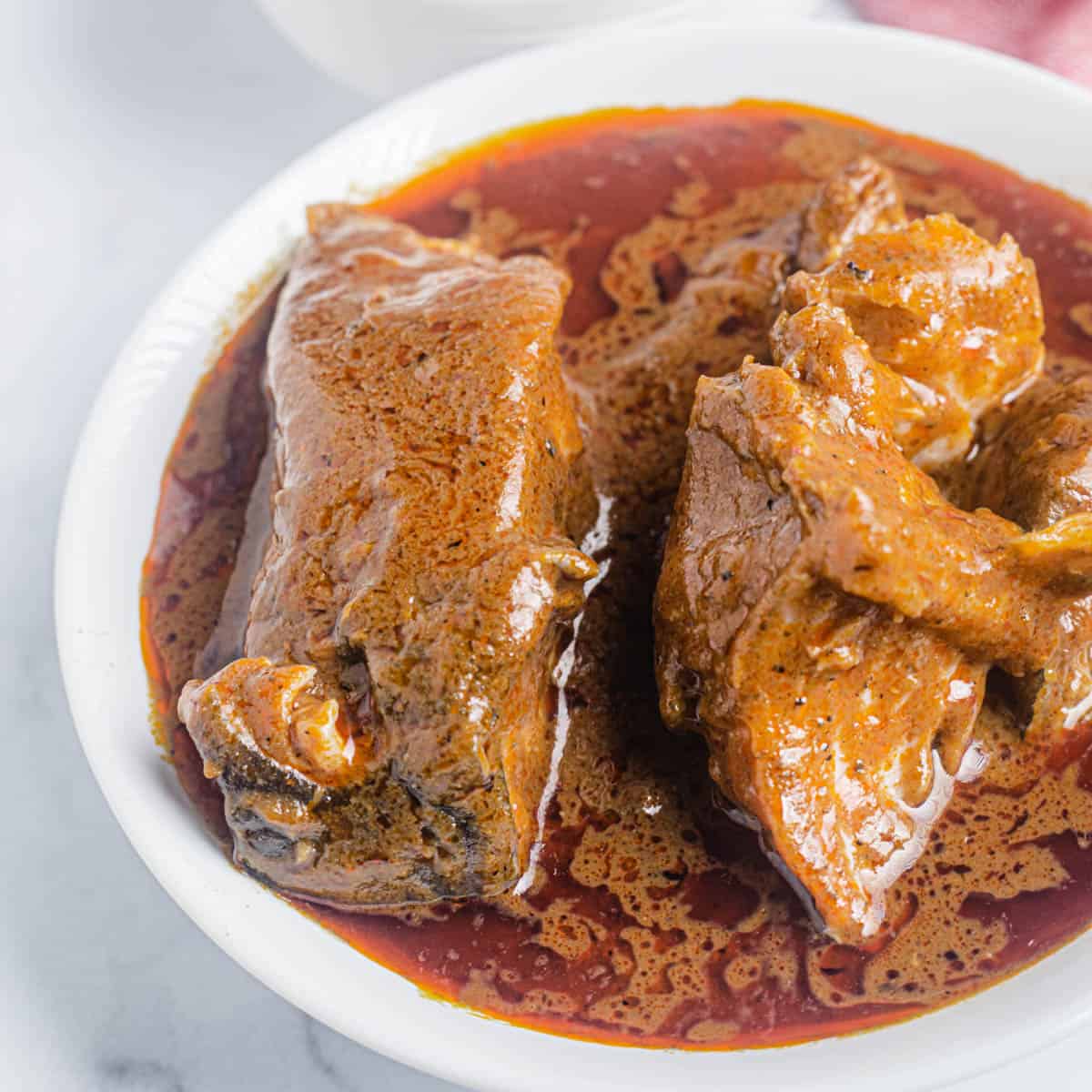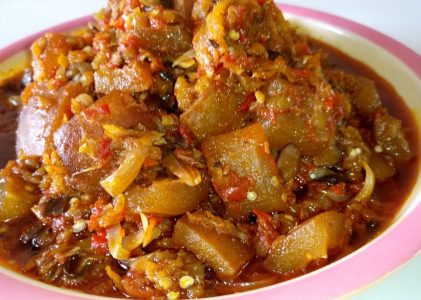Stews and soups in Nigeria form a big part of traditional Nigerian foods. They are excellent meal choices prepared with healthy fats and animal proteins. It is a popular option if you’re on a low-carb diet.
Most Nigerian stews and soups are enveloped with various tastes from different ingredients like palm oil, vegetables, crayfish, fermented locust beans (iru), proteins, and spices to create an extremely nutrient-packed delicacy.
One of the best things about Nigerian soups is that no two of them taste alike. Instead, they all have unique tastes, ranging from sweet and spicy to slightly nutty and distinctly African. It is a known fact that Nigerian soups deliver deliciousness consistently.
Here are some of the best Nigerian soups you need to try when traveling in Nigeria. You can even enjoy them with your traditional Nigerian dishes!
DELICIOUS NIGERIAN SOUPS IN NIGERIA
Beniseed Soup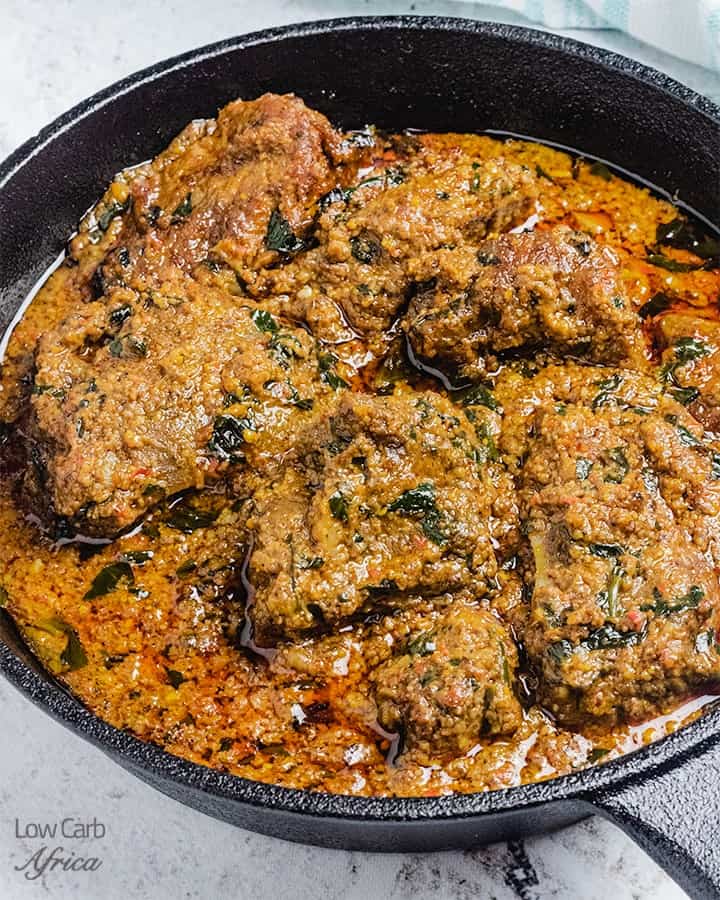
Beniseed Soup is popularly called African sesame seed soup. It is similar in consistency to other nut or seed soups popular in Nigeria, but with its distinct taste. The native Nigerian stew is made from sesame seeds or Beniseed as they are locally known.
It is also known as Esa soup in the Nigerian middle belt region around Benue state inhabited by the Tiv tribe that calls it ‘ishwa’ soup and in Kogi State where it is known as ‘igogo’ soup. It is also common in parts of northern Nigeria where the soup is known as ‘ridi’ in Hausa. Other names include ‘ekuku’, ‘isasa’, and ‘epigorigo’.
Beniseed soup is an intensely flavorful and delicious stew, very similar in consistency to other nut or seed soups (like Egusi, almond, and peanut stew), but with its oily distinct taste. It boasts a unique flavor profile. The soup has a slightly bitter and very nutty taste and packs quite the flavor punch.
It is commonly eaten in the middle belt states of Nigeria with popular starch staples (commonly called fufu) like pounded yam and eba. It has a rich, nutty, irresistible flavor. As the name implies, the soup is made from hulled or unhulled sesame seeds. When roasted, unhulled sesame adds a more exciting flavor to the soup than hulled sesame seeds.
Efo Riro (Nigerian Spinach Soup)![Efo riro (Nigerian Spinach stew recipe) - My Diaspora Kitchen]()
Efo Riro is a native Nigerian dish that is common among the Yoruba tribe. The word Efo means “Spinach” while “Riro” mean stirring. This Nigerian soup is an extract of spinach made by cooking the vegetable with palm oil, locust beans, African crayfish, pepper, stockfish, meat, salt, etc. The two common spinach types used are either the African spinach (Efo Tete) or Lagos spinach(Efo Shoko).
Gbegiri Soup (Beans Soup)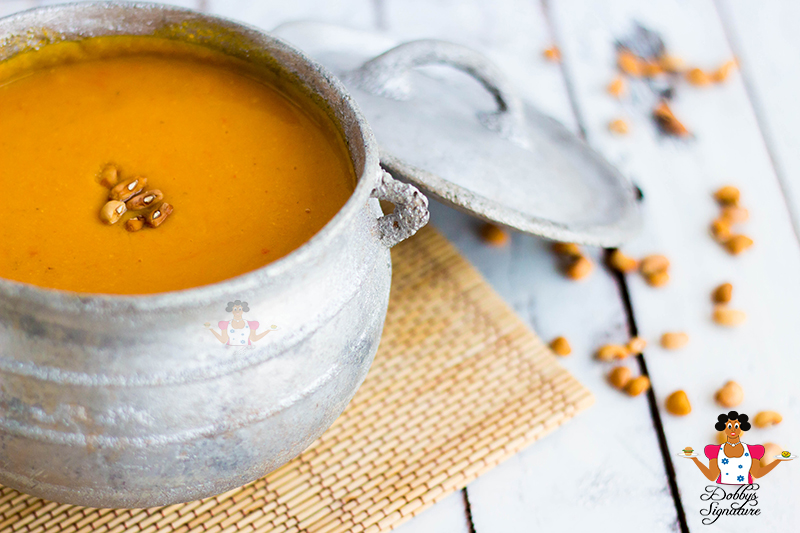
The Gbegiri soup is part of traditional Nigerian cuisine that emerged from the Yoruba tribe of Nigeria. Nigerian food(soup) is made from peeled and cooked beans. The best part of the soup is the bone marrow and biscuit bone that will be added giving it a rich taste. Be sure to try this delightful, mouthwatering Nigerian soup when you visit Nigeria.
The prepared Gbegiri or Abula soup is often served with Ewedu and stew to add more uniqueness to the taste of the food or the meal.
Ofe Onugbu (Bitter Leaf Soup)![BITTER LEAF SOUP (OFE ONUGBU) || HOW TO COOK BITTER LEAF SOUP WITH CHARCOAL FIRE]()
Ofe Onugbu is a popular traditional Nigerian soup also called Bitter leaf soup. Bitter leaf Soup is common among the Igbo tribe of Eastern Nigeria. A lot of people try to avoid bitter leaf soup because they think it is a very bitter Nigerian soup.
Luckily that is not the case; Ofe Onugbu does not taste bitter in the slightest. The leaves have been washed properly to get rid of the bitterness before it was added to the soup.
The delectable Nigerian soup is equipped with a lot of healthy natural flavor that quenches one’s hunger immediately. Ofe Onugnu is similar to the Cameroon Ndole. Nigeria is very blessed with different dishes, one of which happened to be Bitter leaf soup.
It’s made with a combination of bitter leaf, cocoyam paste, red palm oil, dried fish, beef and tripe, crayfish, seasoning cubes, and a traditional seasoning called Ogiri Igbo. The ingredients are simmered in a covered pot of water until the cocoyam lumps dissolve and the other ingredients develop a tender consistency.
Ofe Nsala (White Soup)
The Eastern part of Nigeria is known for making the mouth-watering delicacy, especially the people of Anambra state. The unique feature of this soup is that you do not cook it with Palm oil. The major components of this soup are yam and catfish. Ofe Nsala is a bit similar to the Efik soup called Afia Efere, but the extra condiments make it different from Nsala.
Banga Soup (Palm Oil Soup)![Banga Soup (Palm Nut Soup) - Low Carb Africa]()
One of the dishes in Nigeria is the palm nut soup which is popularly known as Banga soup. It is a traditional Nigerian food from the Urhobo people in Niger Delta, Nigeria. It serves as a soup on several staple foods(Swallow) like pounded yam, fufu, eba, and amala.
Aside from all the delicious traditional Nigerian food, the Banga soup is a must-try if you are visiting the Niger Delta axis of Nigeria.
There are several ways to prepare Banga soup. The taste varies depending on the region where it is prepared. The Urhobo people prepare theirs with fresh palm fruit, a variety of fish and meat, onions, garlic, scotch bonnet peppers, oburunbebe stick (licorice), beletete leaves (bush apple), and Banga spice leaves.
Afang Soup (Spinach And Okazi Leaves)
Afang vegetable soup evolved from the Efik tribe that dwells in the Southern part of Nigeria. The Ibibio and Anang people are the origin of the slippery vegetable soup loaded with several types of meat and fish like crayfish and stockfish.
The Afang soup is a delight to behold and to eat, the uniqueness of the meal says it all. It is also a healthy way of adding more greens to your diet and meal plans.
The slimy textured soup is loaded with chunks of vegetables, protein, meat, palm oil, spices, and seasoning. To crown it all, it is best paired with your favorite starchy side. The soup is mostly eaten with pounded yam or any sort of fufu or eba and it.
Black Soup![Edo Black Soup Recipe by Foodiescene/ Pat's Kitchen - Cookpad]()
Black soup is a traditional Nigerian soup from Edo state. It is known for its amazing texture, and flavor. The delicious and easy-to-prepare soup in Nigeria is also known as Efirin soup, scent leaf soup, or Eweluje, traditionally eaten with fufu dishes.
The tasty and nutritious Nigerian soup is native to the people from the south. It is a staple dish made by a combination of egusi, blending scent leaves, cooked meat and stockfish, ground crayfish, and stock. You have to taste it to fully appreciate it fully!
Catfish Pepper Soup
Catfish soup is a traditional Nigerian soup, it is equipped with a lot of nutritional benefits that make it delicious and easy to make. The Nigerian Catfish pepper soup is another variation of peppered Nigerian soup. It is one of the comforting and heartwarming soups in Nigeria with a kick of spices.
Catfish pepper soup is always high in demand by guests at Nigerian restaurants and it is the most common pepper soup cooked in Nigeria. The Nigerian pepper soup is mostly prepared hot (very spicy) but you can adjust the hotness to suit your needs. It is made hot as it is known for its cold remedy. You can have it any time of the day and it is sure to cheer you right up.
The traditional Nigerian pepper soup is enveloped with a lot of unique flavors due to the natural ingredients used. It is prepared with fried yam, vegetables, plantain, and any other protein of choices like beef, poultry, and fish. This soup is easy and quick to make, a simple Nigerian side dish that is perfect for all weather.
POPULAR NIGERIAN STEWS IN NIGERIA
Ofada Stew (Ayamase Stew Or Designer Stew)![HOW TO COOK PERFECT AYAMASE STEW - OFADA STEW | SISI JEMIMAH - YouTube]()
The Ofada stew is a popular native Yoruba stew, also called rich stew or Ayamase stew. The stew is made with red bell peppers, bleached palm oil, locust beans, onions, crayfish, stockfish, and a variety of meat like beef, cow foot, tripe, beef, turkey, chicken, and ponmo.
Once the stew is ready, it is usually served with Ofada rice(an unpolished short grain local rice that is grown in southwest Nigeria) or plain rice.
Nigerian Beef Stew (African Stew)
Nigerian Beef Stew is Nigeria’s classic soup made with tomato stew recipes. Every beef stew is prepared with stitch bonnet(Ata rodo), onions, garlic, ginger, tomatoes, red bell pepper(Tatashe), and beef. I must say Beef Stew is not peculiar to Nigeria alone but to the whole of West Africa.
In some parts of Nigeria, It is called Ref Tomato Stew or African Stew. Beef Stew goes well with bread, yam, plain okra, and ewedu, not forgetting some Nigerian soups too.
The Nigerian stew has been satisfying stomachs for years. It is perfect even with plain boiled rice. Some people add beef stew to their jollof rice and fried rice because you can almost never go wrong with it.
Garden Egg Stew (Nigerian Eggplant Sauce)![Garden Egg Sauce/Stew (Egg Plant Sauce) – Afrikaanse Recepten en Keuken]()
Also known as Aubergine stew or Nigerian eggplant sauce, this is one of the simple yet delicious stews or soups in Nigeria.
Garden Egg in Africa is actually a type of white eggplant that is small and has a teardrop shape. It belongs to the Solanaceae or nightshade family and it’s a native of Africa but cultivated in different countries.
The garden egg is cooked till soft and then pounded into a puree in a mortar after removing the skin. This eggplant is known to be highly nutritious and thus many consider this a healthy dish.
Garden egg stews are best served with boiled yam, boiled plantain, fried plantain, and white yam.
Meatball Stew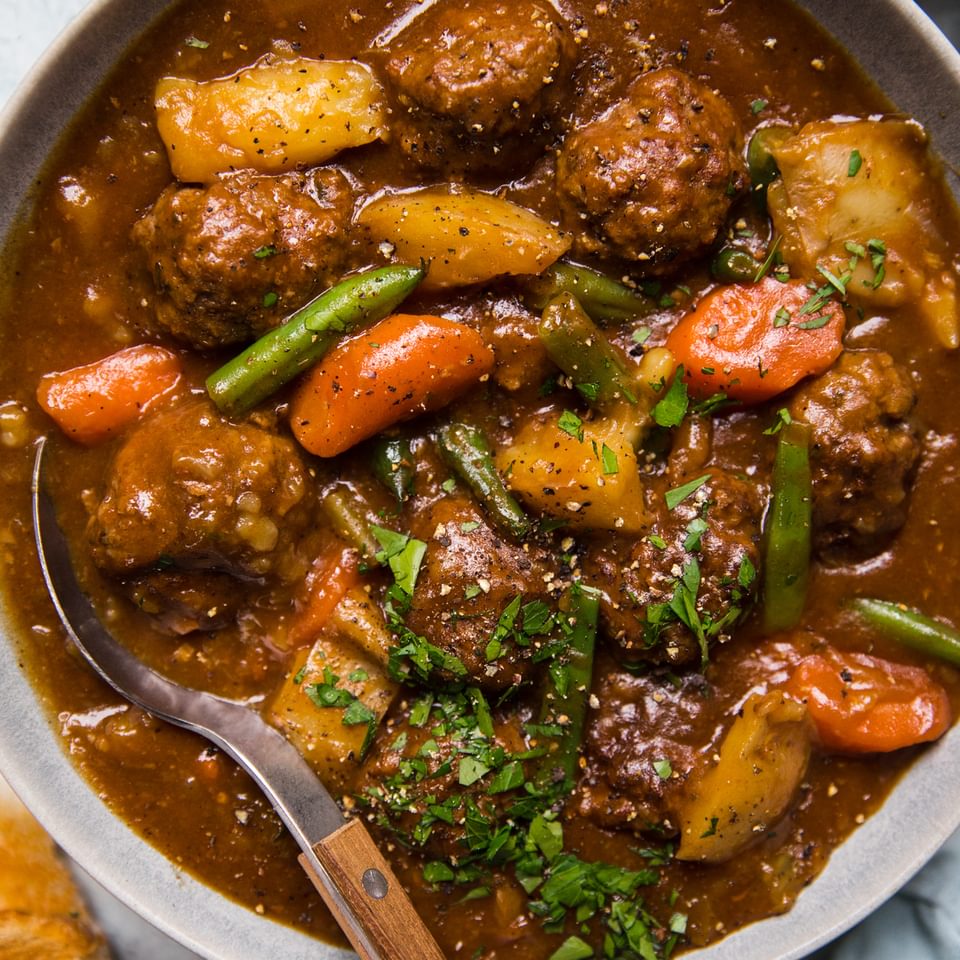
Unless you are a vegetarian, who doesn’t love a good meat stew? Meatball Stew is an easy twist of the classic red stew that uses juicy meatballs instead of the lumps of meat that is mostly found in Nigerian stews.
Meatball stew, like Corned Beef Stew, is commonly eaten with boiled white rice, boiled pasta (spaghetti, macaroni), boiled yam, and boiled potatoes. You can even add big chunks of carrots and potatoes into the stew to make a meal you can eat on its own
Mama Put Stew: Authentic Buka Stew![Buka Stew With Assorted Meats (Obe Ata) - African Food Network]()
Start your day with some delicious and special Buka Nigerian stew. Buka stew is also known as the restaurant’s stew (In Nigeria, Buka or mama put means restaurant).
Buka stews are different from the regular stew prepared. It has a distinct taste and delicious smell that would attract you from afar. It is prepared with soft peppers, not spoiled but soft, also the palm oil is bleached to prepare this stew.
Seasonings used in preparing the stew are minimal, too much seasoning/spices will alter the taste. The classic Yoruba stew was made popular by local buka joints in western Nigeria.
Nigerians love eating in bukas because food is cheaper, fresh, and provides diverse local dishes without the stress of cooking.
Besides, the recipe used is simple, versatile, delicious, and easy to make. You can tweak it to your own preference and that is why you will find different variations of it. This Nigerian stew is generaly made with assorted meat, cooked in tomato base (Nigerian pepper mix) and palm oil.
Palm Oil Based Pepper Stew (Obe Ata):max_bytes(150000):strip_icc()/__opt__aboutcom__coeus__resources__content_migration__serious_eats__seriouseats.com__2020__02__20200224-obe-ata-vicky-wasik-20-1500x1125-9b6e795b3f98481fb24e288ca8be5f6b.jpg)
The palm oil-based pepper stew(Obe Ata) is one of the favorite stews in the western part of Nigeria. Obe Ata is similar to the Nigerian tomato stew, the only difference is replacing vegetable oil with palm oil and the use of local spices like onions, ginger, garlic, red pepper, etc.
To many Nigerians, palm oil stew is a lifesaver because you can make a big batch and store it in small containers in the freezer. It can be served with rice and yam or add some vegetables and you have your soup for ‘swallow’.
The palm oil is either unbleached or bleached depending on usage of the stew and personal preference. If left unbleached, it can be used for a wider range of dishes including soups for swallow.
Vegetables are also added to the stew for flavor and diversity e.g. Shoko, Green Amaranth, Ewedu, Okro, Scent leaf, Curry leaf (Partminger), etc.
DISCOVERING STEWS AND SOUPS IN NIGERIA
Nigerian soups and stews are some of the best in the world! From the classic red stew to more modern twists like meatball stew, there are so many options to choose from.
Soups and stews play an important role in the Nigerian diet, they are not only healthy but also very delicious. When it comes to stews and soups in Nigeria, there is a dish for every occasion, whether you want something light and healthy or rich and hearty.
Write up Culled from NOMADSUNVEILED website
Picture reps culled from
Sisi Jemimah,s Kitchen
My Active Kitchen
African Food Network
Nigerian Recipe
Skabash
All Nigerian Recipe
Modern Proper
Grocery Coop
To mention but a few




